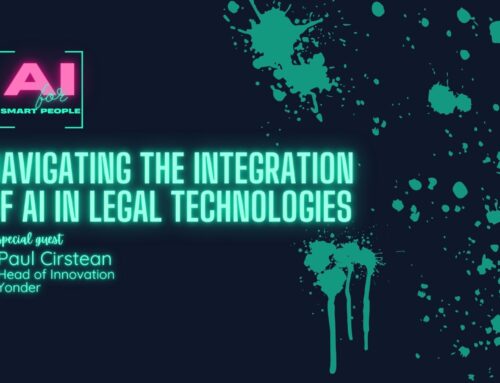Getting Ready for AI: Guardrails You Need in Place Today
Featuring Shawnna Hoffman, President of Guardrail Technologies, this episode focused on the essential topic of AI guardrails. Here are the key takeaways from the episode.
The Importance of Guardrails in AI
Shawnna emphasized that AI is a probabilistic model, meaning it can never be 100% correct. This inherent uncertainty necessitates the implementation of guardrails to ensure AI systems are used responsibly and effectively. She highlighted that these guardrails are crucial because AI’s decisions and actions can have significant consequences, especially in regulated industries like healthcare and finance.
Real-World Examples
Drawing from her extensive career, Shawnna shared several real-world examples of how AI can be both beneficial and risky. She mentioned working with hospitals where AI’s incorrect answers could potentially be dangerous. Therefore, implementing guardrails to check and verify AI outputs is vital to avoid severe repercussions.
Insights on AI Implementation
Cheryl Wilson Griffin underscored the importance of implementing robust guardrails for AI. She highlighted that in the legal field, the stakes are incredibly high due to the potential impact on client outcomes and firm reputation. Cheryl stressed the need for a balanced approach that includes both technological and human oversight to maintain the integrity and reliability of AI systems.
Overselling AI
One of the critical issues addressed was the overselling of AI capabilities. Shawnna explained that during her time at IBM, sales teams often promised more than AI could deliver, leading to unrealistic expectations. To mitigate this, it was essential to educate both sales teams and clients about the realistic capabilities and limitations of AI.
The Role of Governance Committees
The discussion highlighted the importance of establishing AI governance committees within organizations. These committees should include diverse perspectives, not just from technical experts but also from various departments and roles within the organization. This inclusive approach helps ensure that AI implementations are well-rounded and consider multiple facets of the business and its impacts.
Addressing Bias and Data Integrity
A significant portion of the discussion revolved around the issues of bias and data integrity. Biased data leads to biased outcomes, which can perpetuate existing inequalities. An example was shared of Amazon’s AI-based hiring tool that inadvertently favored male candidates because it was trained on a biased dataset. To combat this, it is crucial to have processes in place to identify and mitigate biases in data.
Practical Steps for Implementation
Shawnna provided practical advice for organizations looking to implement AI responsibly. She recommended starting with small pilot projects to understand the data and refine the AI models. Additionally, having data scientists involved in the AI projects ensures data is correctly interpreted and used.
Regulatory Landscape
The conversation also touched on the evolving regulatory landscape for AI. Staying informed about regulations and participating in discussions and responses to proposed regulations is necessary. This proactive approach helps organizations prepare for and comply with new regulations while also influencing their development.
Looking Forward
Optimism about the future of AI in the legal field was expressed. With the right guardrails and governance in place, AI can significantly enhance legal practice by automating mundane tasks and providing deeper insights. However, this requires continuous education and adaptation to new challenges and developments in AI technology.
In conclusion, the episode provided valuable insights into how organizations can implement AI responsibly. By establishing robust guardrails, addressing biases, and involving diverse perspectives in governance, legal professionals can harness the power of AI while mitigating risks and ensuring ethical use.



